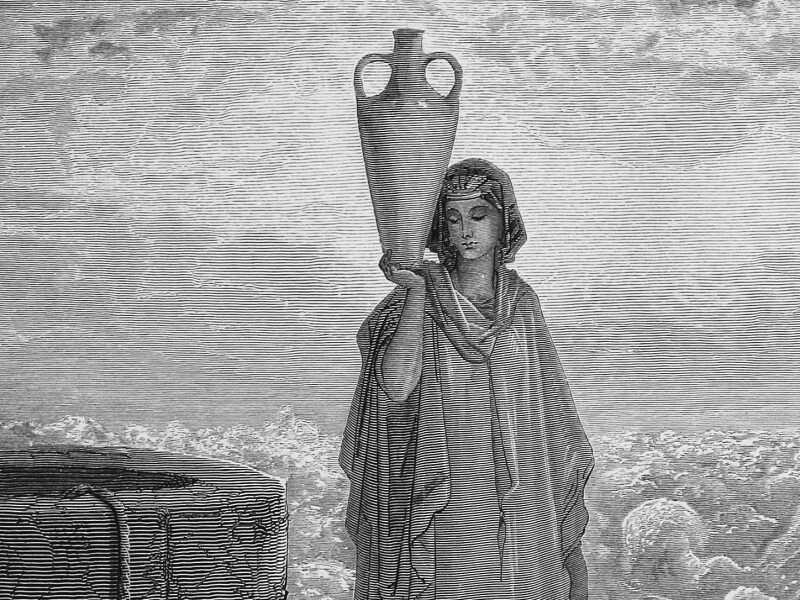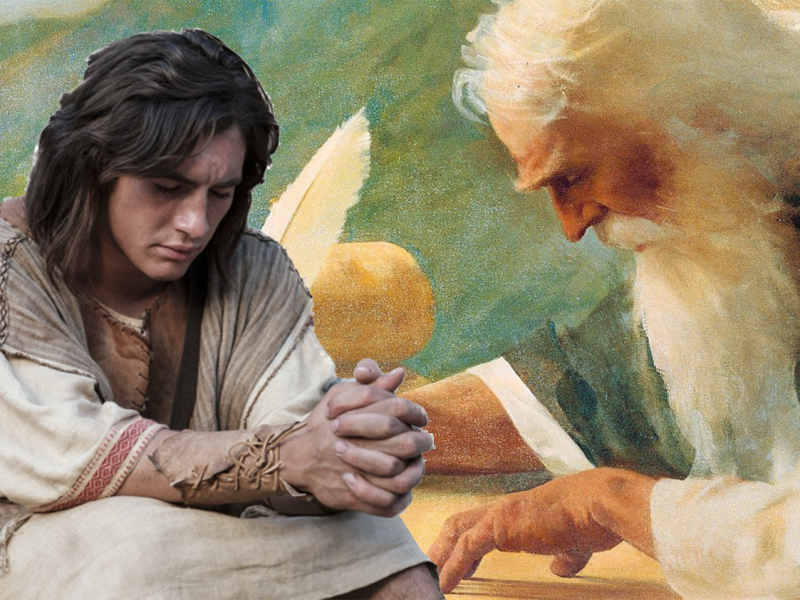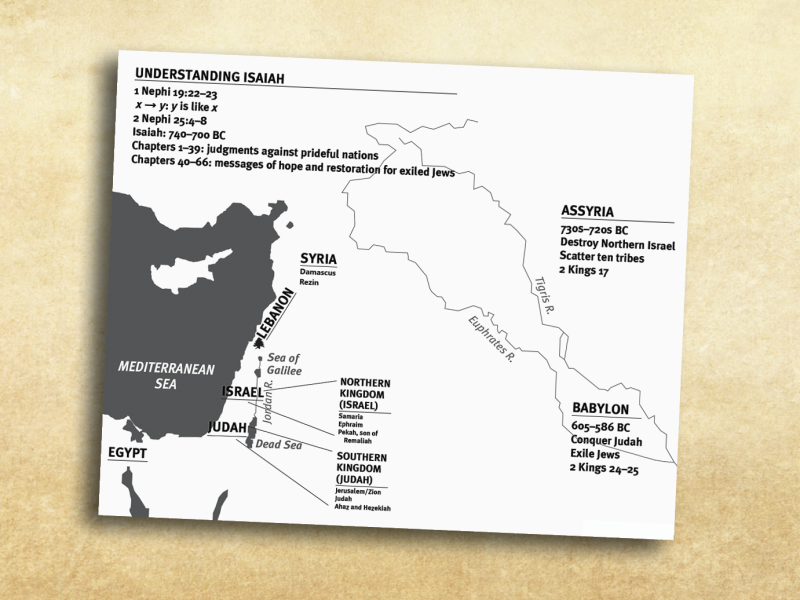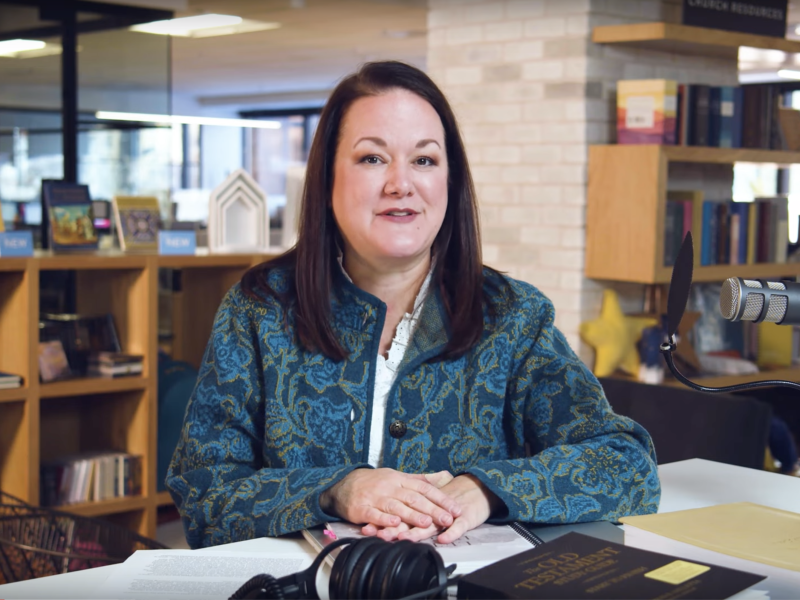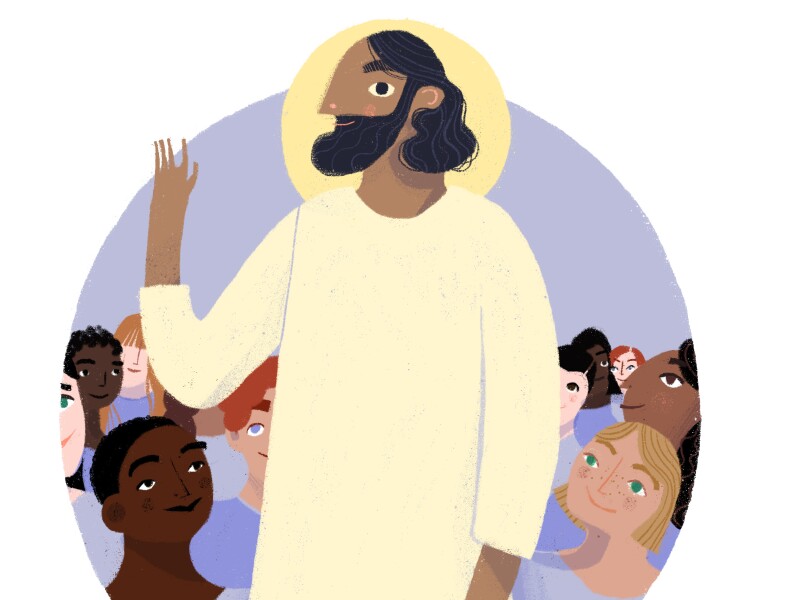These powerful definitions can help shine a new light on the Old Testament.
6 Min Read
“We don’t have to go only to the stories where He appears to someone to find Him—He is in every story.”
2 Min Read
These restored truths clarify Eve’s courageous role in the plan of salvation.
2 Min Read
Get excited for a new year of study with these amazing scriptures.
1 Min Read
The blessings of studying the Old Testament are there, but sometimes they only come through a wrestle.
5 Min Read
“The more we know these prophecies, the more we can step forward with courage and strength and do hard things and help gather Israel.”
1 Min Read
The latest wave of updates to the General Handbook includes an adjustment to a portion about editions and translations of the Holy Bible.
1 Min Read
Shannon Foster knows what it’s like to struggle with scripture study—and she’s found a solution.
3 Min Read
What if faith has nothing to do with hoping God helps us?
2 Min Read
“This may be the most memorable thing we did when my sister returned home from serving her mission.”
2 Min Read
This scripture from the Old Testament reminds us not to rush ahead of God’s timing.
2 Min Read
Here are a few encouraging verses to save for when you need a pick-me-up.
1 Min Read
“I wish I could whisper [this scripture] to every one of God’s girls,” President Freeman wrote.
1 Min Read
This verse is one of the best hidden gems in the Bible.
2 Min Read
There are many mothers in the scriptures with valuable stories—here are just five from the Old Testament that we have a lot to learn from.
7 Min Read
Pelicans, peacocks, and owls? See which birds mentioned in the Bible you’re familiar with and which ones you may have never heard of before.
2 Min Read
Astrology's popularity is on the rise. What does the Church have to say about it?
6 Min Read
This year our Come, Follow Me study concludes with the “minor prophets”—though sometimes obscure, they’re just as full of eternal truths.
6 Min Read
Courses are taught by experts in their fields and range from how to improve your scripture study to overcoming doubts to talking to your kids about tough topics like pornography.
2 Min Read
Opinions and beliefs about the mother of the human race are wide and varied, especially from religion to religion. Here are five insights from Latter-Day Saint leaders that may influence how you think about our glorious Mother Eve.
5 Min Read
“There has never been a better time for us to search—not skim, not skip, not avoid—but really search Isaiah.”
6 Min Read
The Isaiah Map is the tool you never knew you needed—let it help you study and teach this tricky book of scripture.
9 Min Read
In preparing for this week’s Come, Follow Me lesson, I keep accidentally typing “virtual” instead of “virtuous.” Which got me thinking, what would it mean to be a virtually virtuous woman or man?
6 Min Read
When depression and anxiety robbed my ability to feel the Spirit, I learned how to choose to trust God even when I couldn’t feel Him.
6 Min Read
Recognizing the role that poetic tools play in the scriptures deepens our connection to the sacred text.
5 Min Read
You may have been surprised to discover that the calendar lists the book of Psalms for our “Come, Follow Me” study for the next three weeks. Here are some interesting facts you might not have known about this book of scripture.
7 Min Read
Shiphrah and Puah saved him, his mother saved him, and then Miriam, his older sister, is going to save him.
2 Min Read
Maybe you recently sat down to read a chapter of the Old Testament and wondered how on earth it applies to you. But don’t give up—first, you might want to try out this way of approaching your scripture study.
7 Min Read
In the midst of my emotional distress, the story of Elijah and the juniper tree taught me it’s OK to rest.
5 Min Read
"I found some new gems in the story of Ruth and Naomi that have changed my outlook on my own female friendships."
6 Min Read
Hannah’s story represents the feelings of many couples in our own day who suffer similar concerns.
6 Min Read
Both in-person and online, see the iconic works of James Tissot, whose art was feature in Rob Gardner’s ‘Lamb of God.’
1 Min Read
As the story goes, if you looked upon a brass serpent Moses fashioned and placed on a pole, you could be healed. If you didn’t look—well, you died.
3 Min Read
A number of animals—red heifers, lambs, goats, turtledoves, bulls, pigeons, and a bronze serpent—serve as symbols of Jesus Christ’s atonement or sacrifice.
15 Min Read
The children of Israel were well aware that the hand of the Lord was with Moses and He had sanctioned their exodus. Gratefully, the Lord did not leave them comfortless.
4 Min Read
Who wouldn’t want to have a Sunday School lesson on Joseph in Egypt taught by Donny Osmond himself?
1 Min Read
This week’s “Come, Follow Me” story of Joseph in Egypt can teach us how to choose love over fear or anger.
1 Min Read
If you’re looking for a unique depiction of this week’s Come, Follow Me material, check out this new short film produced by Book of Mormon Central and Messages of Christ.
1 Min Read
The God of Abraham, Isaac, and Jacob is also the God of Sarah, Rebekah, and Leah, and the wives of the patriarchs offer powerful examples of righteous living in difficult times.
8 Min Read
Understanding these Hebrew words may bring some unexpected insights into your Old Testament study this year.
1 Min Read
Was the flood really the "baptism" of the earth? And how does the Joseph Smith Translation help us understand the flood?
7 Min Read
It’s encouraging to see that even in the midst of natural disasters, God is always merciful and loving.
5 Min Read
Though Adam and Eve would leave divinity’s immediate presence, in a very tangible way, Christ would leave with them.
9 Min Read
A former full-time seminary and institute teacher, Tammy loves digging into gospel and shared a profound insight on scripture study.
3 Min Read
Want your child to get the most out of this year’s “Come, Follow Me” study? Here are some resources that might help.
2 Min Read
Think of a time you were on the verge of starting a new chapter in your life. Were you nervous? Excited? Afraid? Maybe a combination of all three? Now imagine how the children of Israel felt as they finally crossed over the Jordan River into the promised land. Their emotions had to be off the charts with each step they took toward their new lives. And as we study Joshua chapters 1–8 and 23–24, we’ll see how they followed God’s counsel to be “strong and of a good courage” in the face of the unknown.
If you had to decide who gave the greatest speech of all time, who would you choose? Maybe included on your list of candidates would be Martin Luther King Jr., Winston Churchill, Sojourner Truth, or Abraham Lincoln. But would you ever consider Moses? This week we’ll dive into Deuteronomy chapters 6–8, 15, 18, 29–30, and 34, and learn about Moses’s last moments with the children of Israel and how his final speech could be one of the greatest of all time.
How do you know if you can trust someone? Whether you feel an instant connection or it's earned over time, the first leap to really trusting someone can be a little scary. In this week’s discussion of Numbers 11–14 and 20–24, we’ll see how the children of Israel made the leap several times not just with each other, but with the Lord as they were asked again and again to trust in Him.
What do you say when someone asks you to do something difficult? Do you sometimes give a noncommittal maybe? Or do you sometimes say yes, but secretly mean no? In this week’s lesson of Exodus 35–40 and Leviticus 1, 16, and 19, we’ll see how the Israelites responded when the Lord asked them to do something difficult, and what we can learn from their response.
After reading this week’s lesson in Exodus, you may be wondering, Why did the Israelites make a golden calf? Didn’t they just see all these miracles that proved there was only one God they should worship? But in this week’s discussion of Exodus 24 and 31–34, we’ll see how the Israelites' experience relates to us and how we can remember to put God first in our lives.
One son; two shoe; three tree; four door—these all sound like completely unrelated items, right? Well, you might be surprised to learn that they're actually a good way to remember the Ten Commandments in order. As we study this week’s lesson in Exodus 18–20, we’ll discuss why remembering the order of the commandments matter and how their meanings and applications reach deeper into our lives than we might have thought.



















